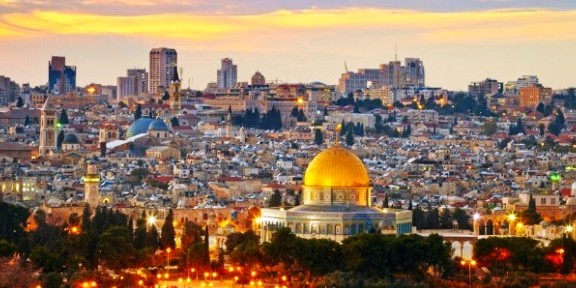
Why Jerusalem Should Remain United
By: Nadav Shragai
Our return home to the historical landmarks of Jerusalem in 1967 was a celebratory occasion, not a calamity, as some professional party-poopers would have us believe. Reclaiming our holiest of sites — the Temple Mount, the Western Wall and the City of David — along with the expansion and reunification of what had been a torn-apart city was indeed a very happy event.
The 200,000 Jews we have settled beyond the dangerous and distorted pre-1967 borders have never been an obstacle to peace, but an obstacle to the redivision of the city. Most residents, Arabs and Jews, would tell you that partitioning the city is not the solution, but a tried and tested recipe for chaos and more hostilities.
Education Minister Naftali Bennett has recently decided to incorporate the unification of the city into school curricula and have pupils well versed on the matter. He wants them to learn about the yearning for the city, as expressed by the poets Judah Halevi and Naomi Shemer; he wants to emphasize the centrality of Jerusalem in Jewish prayers and to explain what we mean when we recite “And to Jerusalem, Your city, may You return in compassion.”
This is a welcome development. Jerusalem is the strongest manifestation of Jewish justice and of our collective memory. Jerusalem has been part of lives for 2,000 years in prayers and rabbinical tales, in celebrations and in mourning, in prose and in poetry.
It was, and still is, one of our most distinct features as a nation. Many years ago, Prime Minister Menachem Begin observed that “Jerusalem has watched over the people of Israel more than the people of Israel watched over Jerusalem.” Now it is time to explain to our children how Jerusalem watched over us and why we owe it so much.
If we fail to do that, if we do not double our commitment to Jerusalem, if we do not strengthen our ties and affection to the city by showing our presence there and thinking about it, we may never understand why it has epitomized the justified Jewish struggle over this land. Of course, instilling this notion is a long-term project, just like the very story behind this city, a story whose journey is not suited for everyone — only experienced trekkers. It is a pity that it took so long for Bennett’s proposal to materialize, but better late than never.
Bennett’s proposal has drawn fire from former MK Haim Ramon, Zionist Union leader Isaac Herzog, and other misguided figures who would like to divide the city. As far as they are concerned, Bennett is “guilty” of trying to make the students more aware that the city was united. How dare he teach them such facts, they say.
Bennett must plead guilty as charged. If he accomplishes his mission, that will be great.
Ramon and his cohorts have tried to exploit Bennett’s plan to attract more support for their new-old movement: “The Movement for Saving Jewish Jerusalem.” That misleading name is their way of calling for the division of the city. The truth is that this group may ultimately bring an end to the Jewish character of the city, rather than save it. It may create problems rather than solve them.
My latest book, “Jerusalem — The Illusion of Partition,” deals with this danger extensively. Partition may bring about a demographic calamity in the city, diluting the Jewish majority rather than bolstering it, and ultimately make things worse for the city when it comes to security. Partitioning the city may limit access by Jewish and Christian worshippers to their holy sites, and areas that have seen Arab and Jews coexist in harmony, despite terrorism, may no longer be found.
Let’s stay away from those false prophets who advocate partition, and act to retain the unity of the city, conceptually and practically.

